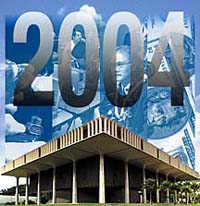
Senate builds
budget on raids
The Senate's version of the state's $3.6 billion supplemental budget bill has room for pay raises, if teachers and blue-collar workers agree to settlements close to the binding arbitration award granted white-collar workers, a key lawmaker said.
Senate Ways and Means Chairman Brian Taniguchi (D, Moiliili-Manoa) said the budget bill approved by the committee yesterday makes pay raises possible because of two other bills that raid revenue surpluses in a wide range of state special funds.
Star-Bulletin Legislature Database
Star-Bulletin Legislature Guide
(PDF, 2.4 MB)
State Legislature: Bills
& Hawaii Revised Statutes
The raids collect about $55.2 million from the special funds and an additional $9 million from the emergency and budget reserve fund, known as the "rainy day fund," and along with other budget adjustments would provide the some $60 million needed in the second half of the coming fiscal year to cover similar pay raises for all state workers, he said.
Differences between the House and Senate on the amounts taken and funds hit will be resolved during budget negotiations later in the legislative session.
On Monday, a three-member arbitration panel granted more than 23,000 members of the Hawaii Government Employees Association a two-year contract with a 5 percent pay raise, effective Jan. 1, 2005, and step raises beginning July 1, 2004. There's no retroactive pay increase.
Still pending are settlements with the 13,200-member Hawaii State Teachers Association and the 8,300-member United Public Workers union, representing state and county blue-collar workers.
Senate Minority Leader Fred Hemmings (R, Lanikai-Waimanalo), who with the two other Republican members on the Ways and Means Committee voted yesterday against the budget and raid bills, said the Legislature should reject funding the HGEA's pay hikes.
"We cannot implement or continue to have quality programs such as the Hawaii Rx Plus program, fight the 'ice' epidemic or fund other human service programs if we are raiding special funds to find the money to pay for the pay raises," he said.
Hemmings also questioned a provision in the special fund raid bill that shifts transfer authority over fund balances from the executive to the Legislature.
"That's correct, because we appropriate the money," Taniguchi said, adding that Gov. Lingle last year "raided" more special fund money than the Legislature had authorized.
Taniguchi said the raids involve excess revenues in the special funds, which retain sufficient amounts to carry out their purposes and take earnings from the rainy day fund, which mostly remains intact.
He noted that with more than $50 million left in the rainy day fund and some $200 million untouched in the Hawaii Hurricane Relief Fund, the state can get by with a smaller cash carryover at the end of the next fiscal year without jeopardizing the state's credit rating.
Taniguchi said the Senate's financial plan also includes adding $16.7 million to fight the epidemic of crystal methamphetamine drug addictions, down from the $19 million approved by the House. It would be in addition to the $21 million in state and federal funding in the Lingle budget for existing drug and drug-related programs.
On the budget bill itself, a parade of Lingle Cabinet members objected to the Legislature's cost-cutting proposal to eliminate funding for vacant positions in the departments.
